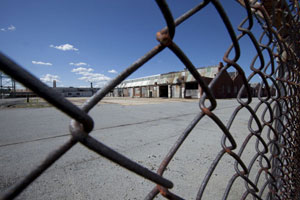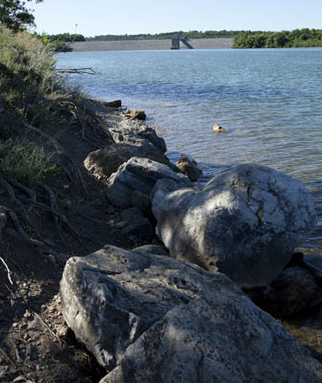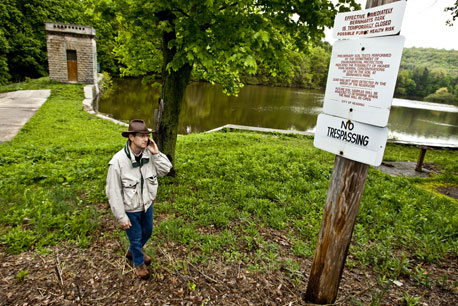Local News from Berks County
Bernhart Park Cleanup Deal Moves Closer (Jan 2011)
Local Lab Accused of Submitting Fraudulent Reports
EPA Orders 14 Berks Municipalities to Improve Stormwater Management
Exide Proposes Partial Clean-up of Lead Contamination at Bernhart Park
PADEP, Exide Reach Agreement on Stormwater Management Plan
Two Berks County Areas Move Closer to Federal Designation for Unsafe Lead Levels
Poultry Plant, Exeter Reach Preliminary Pact
New Water Well Hooked Up In Bally; Residents No Longer Need Bottled Water
PaDEP Issues Air Quality Permit to Berks County Battery Recycler
Final Report Released on Air Toxics Near Riverside Elementary School
2010
Local Lab Accused of Submitting Fraudulent Reports The owner of a local water testing facility and one of his employees stand accused of submitting fraudulent laboratory reports. On Thursday, 1 July 2010, Attorney General Tom Corbett announced the filing of criminal charges against Michael McKenna and Debbie Wanner. McKenna of Cumru Township, Berks County, owns Blue Marsh Laboratories in Amity Township. Wanner of Kenhorst, is employed as the lab’s manager. The Attorney General said many of Blue Marsh’s customers hold permits issued by the state Department of Environmental Protection or the federal Environmental Protection Agency requiring them to have their drinking water or wastewater tested for contaminants. Corbett said his office’s investigation revealed widespread falsification of data on the reports that Blue Marsh provided to its customers. According to the grand jury that recommended the filing of charges, there were instances in which either McKenna or Wanner instructed Blue Marsh employees to fabricate analytical data to appease their customers. The grand jury investigation determined Blue Marsh provided more than 300 fraudulent certificates of analysis to various customers between 2005 and 2008. |
Blue Marsh Dam Breast McKenna is charged with 55 counts each of deceptive or fraudulent business practices, theft by deception, unlawful conduct, and receiving stolen property; four counts of criminal conspiracy; and one count of corrupt organizations. Wanner is charged with 55 counts of unlawful conduct, four counts of criminal conspiracy, and one count of corrupt organizations. Back to top |
|---|
PaDEP Seeks Public Comment on Revised Draft Air Quality Operating Permit for Exide’s Lead Smelter in Berks County The Pennsylvania Department of Environmental Protection (PaDEP) is seeking public comments on a revised draft air quality permit for Exide’s lead smelter facility in Berks County. If issued, the revised draft permit would replace Exide’s current Title V operating permit, which was issued back in November of 2000. Exide applied to renew its existing Title V permit in 2005, even though at the time PaDEP was in the process of pursuing enforcement action against Exide for repeated non-compliance issues at the facility, specifically related to malodors. Over the past five years, PaDEP has sent Exide air quality notices of violation and has taken seven air quality penalty actions against the company, including assessing more than $400,000 in penalties. In December 2007, PaDEP and Exide entered into a Consent Order and Agreement requiring the company to address malodors and other air quality issues at the facility. Exide submitted a comprehensive malodor study and control plan in May of 2008. Once work under the Agreement was proceeding appropriately, PaDEP began reviewing the permit renewal application and finalized a draft for public comment in April 2009. Several parties then requested a public hearing to address concerns relating to malodors, public health, lead non-attainment status, and PaDEP inspections and enforcement. The public hearing was held in November of 2009. The most significant change to the original draft permit that stems from the public hearing includes a more stringent average time for the facility’s afterburners to ensure compliance with PaDEP’s malodor regulation. Over the past several years, PaDEP has received numerous complaints regarding malodors at Exide’s smelter based in Laureldale. The number of complaints has decreased since the implementation of malodor control measures under the Consent Order and Agreement. PaDEP has not documented a malodor violation since 2008. The documents relevant to Exide’s proposed Title V permit are available at www.depweb.state.pa.us under the “Community Information” section of the Southcentral Regional Office page, which can be accessed by clicking on “Regional Resources”. Comments regarding Exide’s revised draft Title V permit should be directed by the close of business on July the 6th to Thomas J. Hanlon, P.E., East Permitting Section Chief, Air Quality Program, PaDEP Southcentral Region, 909 Elmerton Avenue, Harrisburg, Pennsylvania 17110. Back to top |
|---|
EPA Orders 14 Berks Municipalities to Improve Stormwater Management The U.S. Environmental Protection Agency has issued administrative orders to 14 Berks County municipalities requiring improvements to their Municipal Separate Storm Sewer System (MS4) programs. The Berks municipalities include Alsace Township, Colebrookdale Township, the Borough of Fleetwood, Kenhorst Borough, the Borough of Leesport, Lower Alsace Township, Lower Heidelberg Township, Marion Township, Robeson Township, the Borough of Robesonia, Sinking Spring Borough, the Borough of St. Lawrence, South Heidelberg Township, and the Borough of Womelsdorf. The orders require the cited municipalities to correct problems with their respective MS4 programs and come into compliance with their Clean Water Act permits. MS4s are publicly owned drainage systems, including storm drains, pipes, and ditches, designed to collect and convey stormwater runoff in urbanized areas. Urbanized areas contain large portions of impervious surfaces such as roads, rooftops and parking lots that channel stormwater directly into local streams, rivers, and other water bodies. Improperly managed stormwater runoff from urbanized areas can damage streams, cause significant erosion, and carry excessive nutrients, sediment, toxic metals, volatile organic compounds, and other pollutants downstream. Back to top |
|---|
Bernhart Park, Laureldale Exide Proposes Partial Clean-up of Lead Contamination at Bernhart Park Laureldale battery company Exide Technologies has put forth a new proposal to clean-up lead contamination at Bernhart Park located in Muhlenberg Township. The Park, which is owned by the City of Reading, has been closed since 1996 because of elevated lead levels. The source of lead at Bernhart Park and throughout neighborhoods surrounding the Park is a lead smelter at Exide’s facility that has operated for decades. The facility in question began operating as a battery manufacturing plant in the mid 1930s under the ownership of Bowers Battery Company. General Battery Corporation purchased the facility in 1958 and continued operating the smelter until it was acquired by Exide in 1987. Under Exide’s proposal, only certain areas of the park will be remediated, and contaminated soils will only be remediated to a level of 650 parts per million of lead. The United States Environmental Protection Agency’s (“EPA”) clean-up standard for lead in soil at residential properties where children play is 400 parts per million. EPA’s residential clean-up standard for lead in areas not frequented by children is 1,200 parts per million. EPA has no clean-up standard for soil contaminated by lead at a public park. Several areas on the north side of the 25 acre park, including one where sampling measured lead in the soil at a level of 4,843 parts per million, are not slated for remediation, on the grounds that the area’s topography renders it virtually useless as a play area. Instead, Exide proposes to construct a clean walking path through the area. The United States Environmental Protection Agency is seeking public comment from residents and stakeholders on Exide’s proposed work plan. The plan is available on line at www.epa.gov/reg3wcmd/ca/Exide. The work plan is also available for review in hard copy form at the Laureldale Borough Hall, 3406 Kutztown Road, the Muhlenberg Township Office Building, 5401 Leesport Avenue in Temple, and the Muhlenberg Community Library, 3612 Kutztown Road in Laureldale. Comments must be submitted to EPA by May the 17th 2010. Comments must be submitted in writing via mail, fax or email, and directed to Khai M. Dao, Project Manager, U.S. EPA-Region 3, 1650 Arch Street (3LC30), Philadelphia, Pennsylvania 19103. Mr. Dao can also be reached by phone (1.800.352.1973, ext. 45467), by fax (215.814.3113), and by email (dao.khai.epa.gov). Back to top |
|---|
PADEP, Exide Reach Agreement on Stormwater Management Plan On 19 March 2010, the Pennsylvania Department of Environmental Protection (PaDEP) announced a Consent Order and Agreement with Berks County based Exide Technologies that reportedly will reduce the amount of lead being washed into Berks County waterways. Exide recycles spent lead batteries at its smelting operation in Laureldale. Currently, untreated stormwater run-off from the site flows into an unnamed tributary of Bernhart Creek. In May 2007, PaDEP issued a total maximum daily load, or TMDL, limiting the amount of lead that can be discharged into the creek. |
The Consent Order and Agreement calls for Exide to maximize stormwater collection and treatment by building a new treatment plant with a minimum capacity of 400,000 gallons of water per day. The treated stormwater will be discharged directly to the Schuylkill River through the facility's existing industrial waste line. Under the Consent Order and Agreement, Exide is also obligated to construct an additional 800,000 gallon storage tank that will increase the company's on-site stormwater storage capacity to more than 2 million gallons. The stormwater will be stored until it can be treated at the new plant. As part of the Consent Order and Agreement, PaDEP will issue Exide a new National Pollutant Discharge Elimination System permit, which authorizes the discharge of industrial wastewater. Back to top |
|---|
Two Berks County Areas Move Closer to Federal Designation for Unsafe Lead Levels Two areas of Berks County that do not meet federal lead air-pollution standards are one step closer to being designated as non-attainment areas by the federal government. One area is around the Exide plant in Laureldale, and the second area is around the East Penn Manufacturing plant in Richmond Township. Both plants are involved with making or recycling lead batteries. Lead exposure can cause a range of adverse health effects, most notably in children. Exposures to even low levels of lead early in life have been linked to effects on IQ, learning, memory and behavior. In 2008, the United States Environmental Protection Agency (“EPA”) adopted lead standards 10 times stricter than previous standards. On the 18th of November 2009, a report by the Pennsylvania Department of Environmental Protection (“PaDEP”) recommended that EPA designate as nonattainment areas two sites in Berks County where levels of lead in the air at monitoring stations exceeded the new standards. On June the 14th, 2010, EPA Region 3 Administrator Shawn Garvin announced that the Agency proposes to adopt PaDEP’s recommendations. The proposed “North Reading Nonattainment Area” comprises Laureldale and Muhlenberg and Alsace Townships. A monitor in Laureldale recorded 0.38 micrograms of lead per cubic meter of air, according to the PaDEP report. The standard is 0.15 micrograms per cubic meter. The proposed “Lyons Lead Nonattainment Area” comprises Richmond and Maxatawny Townships, and the Boroughs of Lyons and Kutztown. Monitors in these areas recorded 0.22 micrograms of lead per cubic meter of air. Back to top |
|---|
(22 September 2010) Holly Herman of The Reading Eagle reports as follows in the paper’s Wednesday, September 22nd 2010 edition: “A Berks County judge Tuesday approved a preliminary settlement of a sewage dispute between an Exeter Township poultry processing plant and the Township. In return, the poultry plant will be allowed to obtain a sewer permit and to discharge more than 75,000 gallons of sewage per day into the Township sewer system. “We will cooperate with all of the terms of the agreement,” said Paul Bridges company Vice-President of Operations. The preliminary agreement was presented to Judge Timothy J. Rowley by John J. Mahoney, |
assistant Township solicitor, and David R. Beane, a lawyer for Mehadrin. Rowley asked that attorneys present a final agreement within two weeks. In April, the Township ordered the poultry plant to close because it was discharging 329,000 gallons of sewage per day into the sewer system. The plant at 1100 Lincoln Road has 185 employees. Mahoney said the Township supervisors agreed to the terms of the settlement. According to the agreement: [1] Mehadrin must pay $100,000 by Thursday and $50,000 by Nov. 2. It must make five monthly payments of $28,000, starting Oct. 29. [2] The Township sewer authority will negotiate terms for the plant to discharge more than 75,000 gallons of sewage a day. [3] If Mehadrin fails to abide by the agreement, the Township can order the plant closed.” Back to top |
|---|---|
New Water Well Hooked Up In Bally; Residents No Longer Need Bottled Water |
|---|
(19 October 2010) The United States Environmental Protection Agency (EPA) announced on September 23rd 2010 that a new drinking water well has been hooked up to the Bally Borough public water system, and that residents no longer have to rely on bottled drinking water. A contractor had been supplying about 1,000 residents with bottled water since 2003 because the Bally water system was contaminated with an industrial solvent, 1,4-dioxane, that EPA believed came from the Bally Groundwater Superfund Site. EPA considers 1,4 dioxane to be a probable human carcinogen. The groundwater contamination is attributed to past operations at the former Bally Engineered Structures manufacturing plant that operated in Bally from the 1930s to 1995. To alleviate the contamination, the contaminated well was disconnected from the local water system and hooked up to a new well located in an uncontaminated zone about one mile away. The entire water system was flushed to remove any contaminated water that may have been left from the old well. Water tests conducted by EPA and the Pennsylvania Department of Environmental Protection confirm that 1,4 dioxane is no longer present at levels of concern, which means that customers of the Bally water system may now use tap water for drinking. Back to top |
PaDEP Issues Air Quality Permit to Berks County Battery Recycler (19 October 2010) The Pennsylvania Department of Environmental Protection (PaDEP) has issued a Title V air quality operating permit to Exide Technologies’ lead battery smelter in Berks County. The operating permit is valid for five years and sets air pollution limits and control requirements for the facility. PaDEP last issued a Title V operating permit to Exide in November 2000. The company applied to renew its permit in 2005 while PaDEP was pursuing enforcement actions for repeated violations specifically related to malodors. In December 2007, Exide and PaDEP signed a Consent Order and Agreement that required the company to address malodors and other issues. In May 2008, the company submitted a malodor study and control plan to PaDEP. The plan included the replacement of two smelter afterburners. Both afterburners were replaced by the end of 2009. No malodor violations have been documented since late 2008. |
While the malodor control plan was progressing, PaDEP resumed review of Exide’s Title V renewal application and developed a draft permit in April 2009. After considering input from a public hearing held in November 2009, the Department released a revised draft plan approval for further comment in May 2010. Over the past five years, PaDEP’s air program has sent Exide 17 air quality notices of violation, and has initiated seven air quality penalty actions. Past violations included emission, operating parameter, monitoring, reporting, maintenance and equipment operational problems. Penalties collected total more than $400,000. As a result of PaDEP’s enforcement actions, the Department reports that significant improvements have been made at Exide’s facility. PaDEP required Exide to correct all outstanding air quality violations prior to issuing the Title V permit. Back to top |
|---|
(15 November 2010) The U.S. Environmental Protection Agency has made available its final report on monitoring for air toxics near the Riverside Elementary School in Reading. The report, posted on the agency’s website at www.epa.gov/schoolair/schools, concludes that EPA found no concern for short or long term health risks from air toxics, specifically hexavalent chromium, outside the school. Riverside is one of 63 schools in 22 states where EPA monitored outdoor air as part of the agency’s Schools Air Toxics Monitoring Initiative, designed to help EPA and state environmental agencies understand whether long term exposure to air toxics poses health concerns for children and staff at the schools. EPA selected the Riverside school because of its proximity to facilities that emit air toxics and computer models which determined hexavalent chromium may be present at elevated levels in the outdoor air. Because no concentrations of concern were found at the school, air monitoring at the school has been discontinued. |
|---|



